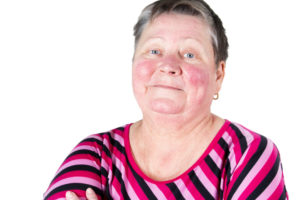Rosacea Needs Proper Treatment
- Posted on: Jan 15 2018
 Rosacea is a common skin condition, and yet it is one that may be misdiagnosed. The reason that this may happen is that rosacea often looks like acne. The most common symptom of this condition is racial redness, usually on the cheeks and across the nose. Furthermore, bumps and pustules may form, looking just like those that occur with acne vulgaris. More unique symptoms of thickening skin and chronic eye irritation may not develop until rosacea has progressed due to lack of treatment. But we don’t want it to go that far.
Rosacea is a common skin condition, and yet it is one that may be misdiagnosed. The reason that this may happen is that rosacea often looks like acne. The most common symptom of this condition is racial redness, usually on the cheeks and across the nose. Furthermore, bumps and pustules may form, looking just like those that occur with acne vulgaris. More unique symptoms of thickening skin and chronic eye irritation may not develop until rosacea has progressed due to lack of treatment. But we don’t want it to go that far.
Rosacea Treatment: First Steps
Ideally, we can reach an accurate diagnosis of rosacea during the early stages of inflammation. If there is an existing flare-up, we may prescribe oral or topical medication. The intent of each type of medication may be slightly different, so more than one may be recommended. For instance, one topical cream may contain active ingredients to reduce inflammation. Oral medication may be a low-dose antibiotic that inhibits the natural fungus that may instigate skin irritation.
Medical treatments are a necessary aspect of managing rosacea. None of the treatments that are prescribed can cure the condition for good. However, with appropriate care at regular intervals, it may be possible to reduce the frequency and severity of flare-ups. In addition to medications, we may suggest laser or light treatments for the reduction of redness and visible veins. Laser and light wavelengths penetrate the skin, where they can be absorbed by blood vessels. Here, they cause the blood to coagulate and the vein to close. Blood will redirect elsewhere without incident. These therapies also stimulate collagen production, which is a necessary healing protein.
Because medical therapies are intended to support the skin, they need to be scheduled routinely and accompanied by daily habits such as avoiding triggers.
Some of the common factors that may cause rosacea to temporarily worsen include:
- Sun exposure
- Heat, such as a sauna
- Alcohol
- Coffee
- Spicy foods
- Windy climate
- Stress
Every person is affected by their unique triggers. Identifying what those are is a crucial second-step in managing the condition of the skin for long-term health.
Do you have questions about rosacea and possible treatment? We can help you. Call 07580 411 350 for friendly assistance.
Posted in: Medical Dermatology

